
on assignment
| T H E N I H C A T A L Y S T | J A N U A R Y - F E B R U A R Y 1 9 9 8 |
POSTBAC TO THE FUTURE: A SNAPSHOT OF NIH'S
| by Lee Mack |
"Behold the infant! Like a shipwrecked sailor, cast ashore by the fury of the billows, the poor child lies naked on the ground, bereft of all means for existence, after Nature has dragged him in pain from his mother's womb. With plaintive wailing he filleth the place of his birth, and he is right for many evils await him in life."
Lucretius, De Rerum Natura
Lucretius probably didn't have pre-IRTAs in mind when he wrote this, but at moments, in a certain light, these words could very well describe the station at which I and others like me have arrived: the pre-IRTA program at NIH and, more specifically, the postbac slot, that place between college and the Great Beyond where we haunt the labs of NIH looking for the meaning of life.
 on assignment |
What is the postbac? The answer will depend on who you are. To a seasoned principal investigator at NIH, a postbac might be a much-needed breath of fresh air. To a newly minted investigator, a postbac may be a critical pair of hands and a junior colleague of a sort, who likewise feels a bit alone in the shark tanks. To another postbac, the postbac may be a co-conspirator, a social outlet, a future collaborator, a rival, or a friend. A postbac may look into the mirror of the soul and see Lucretius' sailor:: a little bit alone, a little bit intimidated, a little stranded on a seemingly deserted isle of science but possessed of remarkable perseverance and ingenuity.
As a postbac myself, I am close to the question at hand. The NIH Catalyst charged me with taking the pulse of this burgeoning population. All well and good, I thought. But from my first question--who are the postbacs, anyway?--I found that my own experience reflected only a fraction of the full range of what a "postbac" may be.
For instance, one of my fellow postbacs has been at NASA and aspires to go into outer space some day. Another grew up on a socialist farming commune in Israel and teaches Hebrew school. Another had just gotten back from a Peace Corps stint in the islands of Tonga. Another knows the East Coast rave scene inside and out. Another is a certified massage technician. More than a few I found were aspiring musicians as well as dedicated researchers. Quite a bunch! So, armed with a tape recorder, a notebook, curiosity, the deductive powers of a mathematician, and about five dollars in cash, I set forth.
The fiver was put to immediate use at the Capitol City Brewery in Bethesda, to which I was summoned by a fortunate e-mail exchange with a fellow postbac by the name of Ary Shalizi, a '96 Oberlin grad working in NIDR. Shalizi and I had two things in common: we'd both been haunting the NIH subterranes for over a year and we were both itching to find out whether there were more of our kind.
A few months back, Shalizi had gotten fed up with knowing only one other postbac on campus and posted a plea for interested postbac homebodies to identify themselves. Over the ensuing weeks, a wave of responses poured in. An amorphous group evolved around a weekly social gathering anonymously christened D(rinks) W(ith) S(cience), where postbacs would meet and greet in a vaguely proletarian spirit.
From this nucleus, word spread quickly round the campus until it became clear there were enough postbacs here to fill a fleet of Volkswagen buses--and yet, no one knew exactly how many there were, where they were, what they were doing, or how to get in touch with them. No one knew the history of the program no one knew, in any general sense, why the postbacs had even been summoned to this mecca of biomedical research in the first place. True to their scientific nature, they wanted some answers, and so did I.
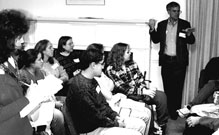 |
I paid a visit to Debbie Cohen, a harried warrior in the Office of Education who somehow manages to juggle the myriad intramural research fellows on campus. Cohen organized a precedent-setting gathering of postbacs at FAES house on October 23rd with Michael Gottesman, deputy director for intramural research,as keynote speaker. The postbac program was his baby, anyway, and he came to lend a supportive ear to the 60 or 70 of us who had been alerted via the e-mail list Shalizi had compiled. The October meeting marked the first formal postbac gathering and set a trend Gottesman says he would like to see perpetuated as a means of staying abreast of evolving concerns of the postbac population, which, he says, could easily be marginalized by its intrinsic transience.
The event was a chance for these strange and furtive beings to get to know each other, share their tales, compare MCAT scores, eat free pizza, and vent all that frustration that had been building for the past three years, since the first postbac had strolled onto the NIH campus. Later, Gottesman reflected that he felt a definite "chemistry" among the participants, which has carried over into several projects now off the ground, including an Internet mailing list for the postbac population, a lecture series aimed at the postbac level, and workshops with med students.
The linchpin of the postbac program is the interaction between the trainee and the teacher. Not surprisingly, the more postbacs I talked to, the greater the variety of experiences I heard about. People's experiences varied widely, from institute to institute and even lab to lab: Some felt they were being used as cheap labor in place of technicians, and others felt they were treated as colleagues some felt a little lost and overlooked in the lab, and others like they were part of a family.
PIs whom I spoke with gave an equally diverse picture. Some, like NCI's Elise Kohn, accentuated the efforts and accomplishments of their postbacs, some of whom, she says, will "take my job and run with it" into the next millennium others like NICHD's Tom Sargent and NIDDK's Debbie Hinton reported mixed results.
I began with the question: Why have postbacs anyway? Hadn't things been running smoothly without the injection of another variable into the research equation?
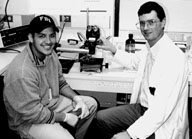
|
|
Consensus held that postbacs add a dimension of vivacity to a laboratory setting. "They make life in the lab more interesting, more fun," Hinton says. She recalled a postbac who wasn't much for the nuts and bolts of research but proved to be quite a character to have around the lab, anyway--until leaving to pursue a law career.
According to Gordon Guroff, NICHD deputy scientific director, postbacs serve as surrogate grad students for NIH. Although some investigators come to NIH specifically to avoid graduate students, many--especially the younger ones--feel they are missing out on an opportunity enjoyed by their academic counterparts, according to Jim Hurley, a PIin NIDDK. Judah Rosner, another NIDDK PI, appreciates the tinge of the university atmosphere he thinks postbacs bring to the NIH campus: "Young people asking young people questions. . .blank slates."
Having a postbac in a lab presents an opportunity for a PI to learn some things as well. Hinton, an NIH veteran of 15 years who'd been skeptical about the teacher role for herself, learned she actually liked it after she'd had several postbacs in lab. And Kohn says she learns "a lot about myself, science, and life from my younger colleagues." Hurley adds, "They bring in a wonderfully fresh perspective, having yet to learn about the 'externalities' of science," a perspective, Hinton observes, that often translates into questions more experienced people may have lost sight of.
This assumes, of course, that a PI is open to such ostensibly amateurish inquiry, a condition most PIs I talked to seemed more than willing to fulfill. Shalizi, the NIDR postbac who got the mailing list going, says his preceptor is very receptive to a new idea "if I can make a good case for it."
"Ultimately," says Rosner, "it boils down to science." In that spirit, postbacs are often treated as junior colleagues. "It's a collegial concept," he explains. "If you're a scientist, you're a scientist."
And being a scientist means you have to meet certain expectations. Kohn, for example, meets personally with everyone in her lab at least once a week, from postdocs on down, in addition to holding a weekly lab meeting at which everyone is expected to present a journal club article and project update on a rotating schedule. Similarly, Gottesman expects that the postbac in his lab, John Gribar, will give a seminar of his work before he leaves.
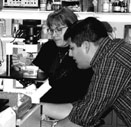 | ||
Among PIs and postbacs who report positive experiences, this level of expectation and reciprocation seems ubiquitous. Hakim Morsli, unusual as a third-year postbac in NIDCD, reports that after an initial six-month training period he was let loose with his own project. As a result, he has submitted a paper to the Journal of Neuroscience and will be giving a talk in February. Michael Dedekian, only five months into his term at NICHD, has already produced results that were partially presented by a labmate at a meeting in Japan. Stuart Hicks, fellow NCI postbac, is a coauthor of a paper appearing in the January 1998 issue of the Journal of Immunology.
Postbacs are involved in many different types of research in almost every institute, ranging from the experience and expression of emotions in adolescents (Laura Mielcarek, NIMH), to cognitive-behavioral studies in rhesus monkeys (Gena Pixley, NIMH), to the embryogenesis of zebrafish (Michael Dedekian, NICHD), diabetes (Alison Cotrell, NIDDK), gene transcription in mammalian cells (Farhang Amini, NICHD), gender differences in pain response (Julie Miller, NIDR), complications in Parkinson's therapeutics (Christina Vaughan, NINDS), and on and on and on. My NCI research (under the direction of Carl Baker, cellular regulation and transformation section) is on the life cycle of papillomaviruses.
Research training is one thing, and providing technical services is another. I got mixed messages about the extent to which postbac naiveté and enthusiasm make us susceptible to excessive demands from overworked mentors.
"The idea is not to use [postbacs] as cheap labor," Sargent says, "[but] when I first heard about the program, I was afraid it could be used in an exploitative way. I think it's a danger." One particularly frank PI said he thought some people viewed the postbac program as another hiring mechanism. Two postbacs from the same lab who have since left NIH and wished to remain anonymous told me their sole responsibility in lab was to run sequencing gels day in and day out.
While limited technical work may expose a student who has no previous relevant lab experience to the methods needed to carry out a project, postbacs who were not brought in under the technical postbac tag are definitely not technicians, according to Gottesman.
In fact, my sleuthing revealed that the use of postbacs as glorified dishwashers is uncommon. Most PIs seem to realize that the goal is to introduce a group of potential future researchers to the culture of biomedical research and to propagate the high standards they themselves inherited from their predecessors. The emphasis across the board was on a holistic research experience. Most post-bacs reported being encouraged to sample from the sometimes-exotic NIH platter by going to seminars, taking classes through FAES, volunteering, setting up collaborations with other groups, and really rolling up their sleeves and getting their hands dirty in the lab. "It's what you should expect when you go into science," says Guroff.
 |
Aside from all the obvious benefits to the arrangement, problems do crop up occasionally, and anomalies often get more attention than everyday successes. The anomalies have led some interest in developing NIH-wide guidelines for postbacs and their mentors. But, as NIDDK's Rosner points out, "It is easy to envision hierarchy and structure, but problem solving is the real mechanism."
Rosner himself is the first official liaison between postbacs and the powers that be in his institute. He serves as a contact person for postbacs with questions or concerns falling outside the scope of a busy PI. The impetus for the creation of this position was NIDDK's Ira Levin, who explains that "in order to ensure that these junior scientists have the best possible experience in the short time they are here, we felt that a contact or liaison individual that they would feel comfortable with would be a useful adjunct for this group. . . it seemed a natural extension of the mentoring concept." Such a liaison would serve as a facilitator of student-mentor dialogue and an external mediator if irreconcilable differences prevent resolution of a conflict. Of the many postbacs who have come through his institute, he has been faced with only one instance in which a change of scenery was necessitated.
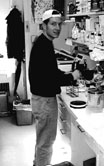 |
At NICHD, Guroff performs a similar function for postbacs. A position like his is needed, he says, because "out of a group of 50 to 70 postbacs, a couple of people are bound to get lost." His responsibilities in this capacity include contacting postbacs before they begin their term of fellowship and advising them on the corollaries of the program, such as paying taxes, mentoring, social contacts, etc. He doesn't fault the PIs--who "daily have to deal with ethical, chemical, animal, radiation safety, and budget concerns"--for the fact that such a liaison is needed.
To date, these are the only two institutes that have designated postbac contacts, and the results speak for themselves. Of all the postbacs I canvassed, NICHD and NIDDK postbacs seemed most comfortable and excited about their experiences. In fact, Guroff mentioned a small diaspora of NCI postbacs into the NICHD ranks.
The key to the continued success of the postbac program is mentoring. As Rosner points out, the "stated purpose of the program is to provide training and encouragement to follow a career in the biomedical sciences." Nevertheless, mentoring is a touchy issue in the trenches, given the conflicting pressures on PIs to run a smooth, productive research organization while also finding the time to be, as a recent mentoring pamphlet published by the National Academy of Sciences puts it, "adviser, teacher, role model, friend" to trainees. One person I spoke with made a clear distinction between the idealistic mentoring "party line" and the everyday reality of competing demands.
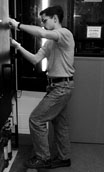 |
As NIH tries to push improved men-touring from the realm of rhetoric into reality at all levels, most postbacs view mentoring as basic to whether their training program works or not. Hicks looks at his PI as his teacher, but Shalizi wryly notes that "to be a postbac implies certain minimal qualifications, but there really are no minimal qualifications to hire a postbac."
In some cases, exemplary mentoring is taking place, as with Morsli, who describes his PI as a "mind-bogglingly good teacher. She made expectations clear from day one and has always been up front with me." No surprise that Morsli says his postbac experience has literally shaped his life and he still gets the chills coming to work every day.
Others have been not as fortunate. One postbac I talked to had been brought on board by a branch chief and then was immediately and haphazardly pawned off to another PI. Although there are few institutional rewards set up to encourage good mentoring, Guroff notes that poor mentoring does not go unnoticed and good mentoring often leads to good research. Furthermore, according to Gottesman, mentoring is often incorporated into promotion evaluation and quadrennial site reviews.
Different PIs have different ideas about what mentoring entails. For example, Kohn keeps in touch with former postbacs and takes an active role in career counseling. She sees a mentor as "guide, teacher, listener, partner, friend, soft shoulder, punching bag, always available, tries to be objective, committed."
Furthermore, she makes the point that "it is a good mentor who can recognize when s/he cannot provide a nurturing and educational environment. It is someone with good introspection who can admit they have not succeeded and seek guidance to bring an unsuccessful partnership around, whether that means finding the other person another scientific home or improving the current one. Not every pairing is perfect."
Sargent agrees. As a Ph.D. and an adjunct professor who teaches genetics and molecular biology at a local university, his mentoring and career counseling can be more relevant to postbacs in his lab who are thinking of going on to a doctoral program or a career in basic research. But for those applying to medical school, his involvement in career advancement, he says, doesn't go much beyond giving general advice, writing recommendations, and referring them to clinical associates more familiar with internships, residencies, and specialization.
Not every postbac is cut out for a research career. Hinton explains her philosophy and expectations at the outset of the fellowship and is as straightforward as possible.
Recently, she sat down with a postbac who had displayed inadequate commitment to the research. Together they set up a schedule, and when the postbac failed to follow the schedule, she advised him that perhaps he was not suited to a career in research science. Such a confrontation is difficult, she says, but necessary.
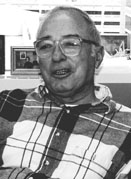 |
Similarly, Guroff observes that the program makes a contribution to the human being, whether a student is inspired to go on to grad school or med school or finds out that he or she never wants to see the inside of a laboratory again, as in the case of NICHD postbac Heather Contaxis, who has decided she will not pursue a career in research science.
Other postbacs who have pretty much concluded they're in it for the long haul aren't Pollyannaish. Hicks says that for the neophyte postbac, "a lot of preconceptions are shattered, such as you're going to have fun all the time and you're going to like everyone. You just don't realize how much work goes into science."

|
Maya Shalev, an NEI postbac, says that "being at the NIH is like being in a foreign country and learning the language of that country. Without the NIH, I don't think I could have lived science and learned science and learned how to be a scientist. . . . It's a world unto itself."
Morsli, a recipient last summer of an NIDCD award for research excellence, says his research experience has been a roller coaster of emotion, and Hicks speaks of his feeling upon arriving here that "there was no one else here like me."
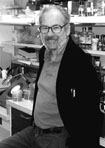
|
This feeling is not uncommon but seems to be dissolving as the postbac contingent gains momentum and coherency. The initiative of postbacs like Shalizi and Dedekian has helped post-bacs locate each other and end feelings of isolation and powerlessness. Dedekian is also organizing a postbac interest group, inspiring some veteran NIHers to question whether collectivization is in the best interests of the postbac community. But most postbacs are pleased that NIH is beginning to take notice and, as Morsli maintains, "we are here to learn research, not unionize."
The goal of Dedekian's group is to provide a regular forum for postbacs to gather and present their research and talk about their experiences, allowing them to learn from one another and cultivate communication skills.
At the first organizational meeting late last year, nearly every one of the two dozen attendees wanted to present their research at the next meeting. Many foresee a day when the group will be a forum for the dissemination of consistently topnotch research that is attended by postbacs and PIs alike.
If there is a take-home message on the nature of what NIDDK postbac Meredith Korneff calls "pre-IRTA-tude," it is that postbacs do much more than is summed up by one postbac's e-mail signature line--"put the labor in laboratory."
We may do that, and doubtless do it well. But to make the program best serve its growing numbers of trainees and mentors, both sides need to vocalize and communicate intelligently and sensitively, and if we do, "it'll work itself out," as Guroff says.